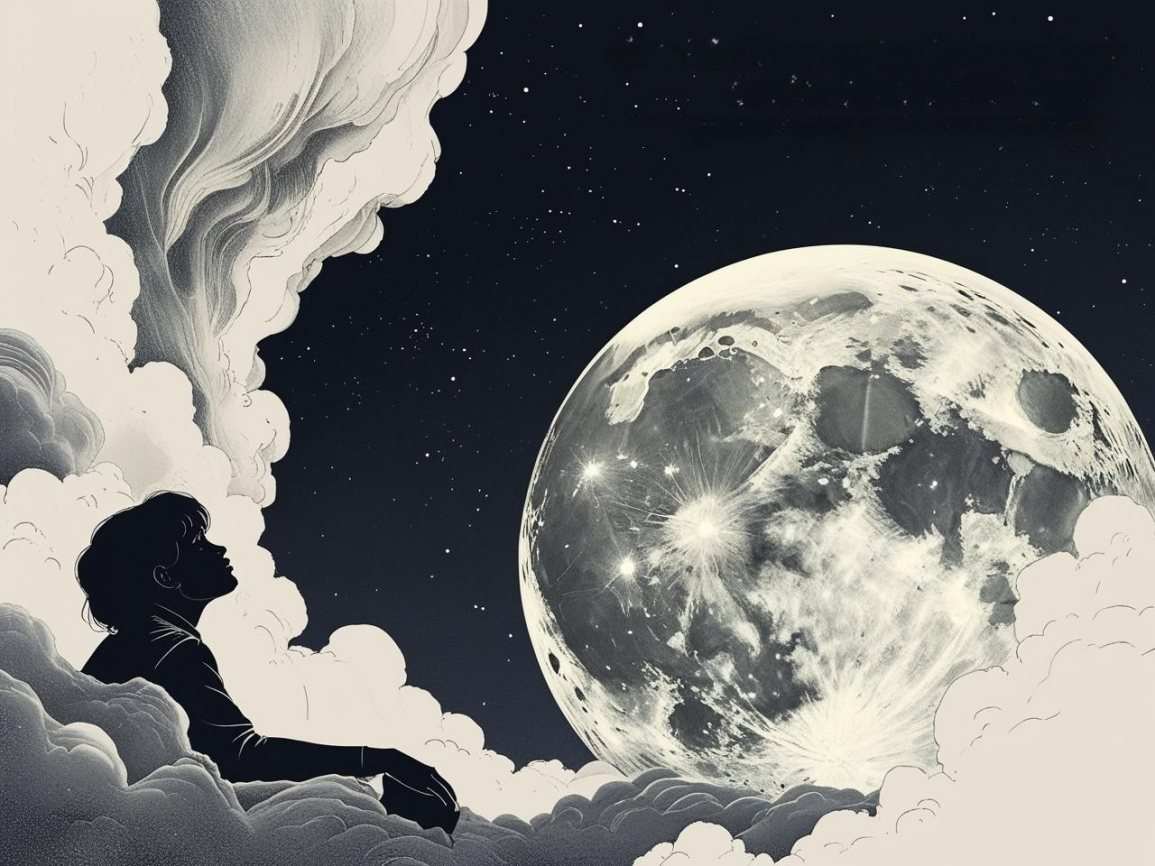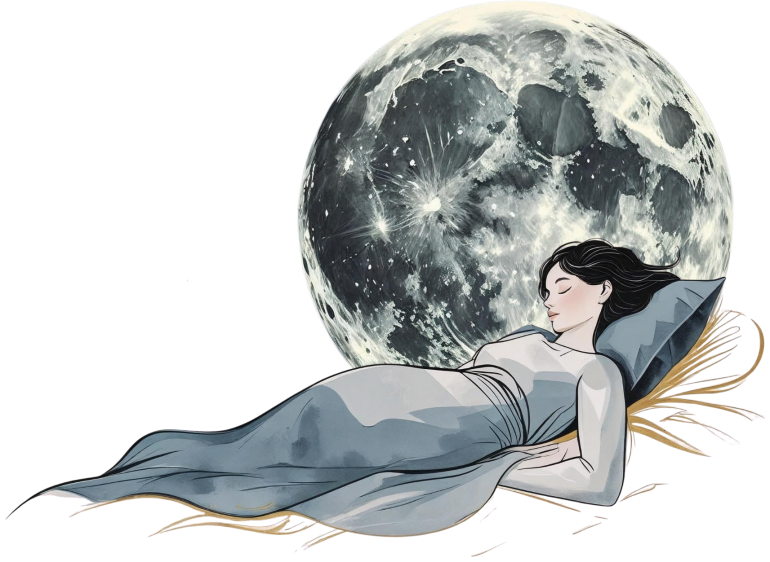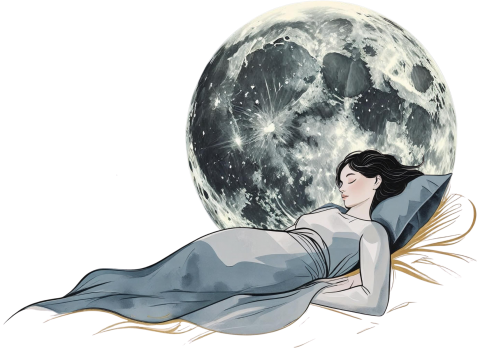Can a Full Moon Really Affect Your Sleep? Here’s What the Science Says
Have you ever found yourself lying awake, wondering, “Why can’t I sleep during a full moon?” You’re not alone. Some people say their sleep is noticeably worse during a full moon, and intriguingly, research suggests there may be something to it. From reduced sleep time to later bedtimes, we’ll explore the science behind how lunar cycles may (or may not) affect our sleep.
Why Can’t I Sleep During a Full Moon?
A number of studies have looked at whether the full moon really impacts sleep, and the findings are mixed. One frequently cited 2013 Study found that in the days surrounding the full moon, participants took longer to fall asleep, had less deep sleep and reported lower sleep quality overall.
These changes were small; around 5 to 20 minutes’ difference, but statistically significant. Another study in Argentina and the US; Moonstruck Sleep (Synchronization of human sleep with the moon cycle under field conditions), found people fell asleep later and slept for shorter durations in the 3-5 nights leading up to the full moon, even when artificial lighting was available.
So… what’s going on?
What the Studies Show About Full Moon Sleep Disruption
Let’s break down the most well-known findings:
- Delayed Sleep Onset - Participants took longer to fall asleep.
- Reduced Deep Sleep (slow wave sleep) - The restorative part of sleep was affected most.
- Lower Melatonin Levels - Melatonin, the body’s natural sleep hormone, was found to be lower around the full moon.
- Shorter Overall Sleep - In some studies, people slept up to 90 minutes less, particularly in rural communities without electricity.
Interestingly, some of these effects were also seen in modern urban populations - including participants in university dorms in the US - showing that even artificial lighting doesn’t entirely override our natural rhythms.
Does Moonlight Affect Melatonin or Circadian Rhythms?
With widespread artificial lighting, it might seem unlikely that moonlight could influence our sleep - but it could, in theory.
Moonlight during a full moon peak at around 0.1 lux, while typical indoor lighting is anywhere between 50-500 lux. For most people, indoor lights and phone screens are far more disruptive to melatonin production than moonlight.
However, for light-sensitive individuals or those living in rural parts of the UK - where outdoor light pollution is lower - the extra brightness from a full moon could subtly affect sleep quality, particularly if blackout blinds or curtains aren’t used.
It’s also worth noting that people with insomnia or anxiety may be more aware of subtle changes in their environment, which could amplify the perceived disruption.

Does the Full Moon affect us differently in the UK?
A study conducted at the Surrey Clinical Research Centre looked at over 200 UK-based participants and found some variations in how the moon affected men and women differently. Women showed decreased REM and deep sleep near full moons, while men showed the opposite.
This suggests there may be biological sensitivities to the lunar cycle even within a UK population, although overall effects were mild and inconsistent. Still, it shows the potential for variation between individuals.
Why You Might Sleep Less Before a Full Moon
Several explanations have been proposed:
- The “Moonlight Hypothesis” - Suggests our ancestors adapted to brighter moonlight by staying active later at night.
- Behavioural Change - People may unknowingly stay up later because of the extra light or cultural expectations around the full moon.
- Biological Response - Lower melatonin, as seen in some studies, may reduce sleep pressure and delay sleep onset.
It’s possible that a combination of these factors leads to a measurable (if small) change in sleep behaviour during certain moon phases.
How to Sleep Better During a Full Moon
If you’ve noticed that your sleep takes a dip around the time of a full moon, there are steps you can take:
- Use blackout curtains or an eye mask to eliminate light from outside, including moonlight.
- Dim indoor lighting in the evening, ideally for 1-2 hours before bed.
- Enable night mode on your devices to reduce blue light, which is known to suppress melatonin.
- Stick to a regular bedtime and wake time, even on weekends.
- Avoid caffeine too late in the day, which can delay sleep even further.
- Get outside early in the day to expose yourself to natural light, helping regulate your body clock.
- If you can’t sleep, get up. Leave the bedroom and do something relaxing, returning only when you feel sleepy again.
For more advice on managing sleep during difficult conditions, see our Summer Sleeping Guide.


Is the Effect of the Full Moon on Sleep Just a Myth?
Some researchers believe the connection is purely psychological - that we’re more likely to notice poor sleep during a full moon because we expect it. Others argue the link may have biological roots but is diminished in modern life due to electric lighting and altered routines.
What we do know is that any effect of the full moon on sleep is likely small and varies from person to person. For some, it’s negligible. For others - especially those with existing sleep issues, it might be one of several factors worth addressing.
Final Thoughts
The full moon might not turn you into a werewolf, but it could subtly nudge your sleep cycle off course. If you're someone who sleeps lighter or struggles to fall asleep around full moon dates, you're not imagining it. While the evidence is mixed, some studies do show small but noticeable changes in sleep quality.
The good news? With a few practical adjustments like looking after your sleep hygiene, creating a personalised space by custom designing the bed and décor. all the lovely things that make you feel more comfortable in the space, will help. Also, by investing in a great quality mattress and refreshing your bedding or bed linen more often, you can start to relax and take back control of your sleep schedule - no matter the lunar phase.
Dr. Lindsay Browning offers sleep therapy at Trouble Sleeping and is the author of the self-help sleep book, Navigating Sleeplessness.
Improve your sleep even further by Booking A Free Sleep Expert Consultation at one of our Nationwide Showrooms or call our dedicated Online Webchat Te
Please Note that the consultation is for one of our And So To Bed sleep experts to assit with design, sleep, not with Dr. Lindsay Browning.
-
Posted by Charlie Vose
6th August 2025


